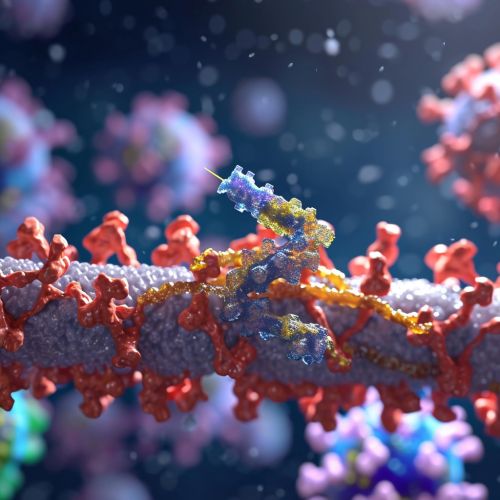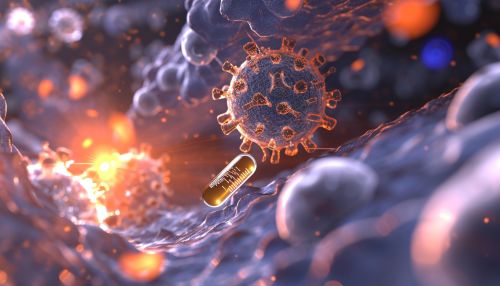Interferon receptors
Introduction
Interferon receptors are a type of protein receptor that respond to interferons, a group of signaling proteins produced and released by host cells in response to the presence of several pathogens, such as viruses, bacteria, parasites, and also tumor cells. Interferon receptors play a critical role in the immune response, mediating the activation of intracellular signaling pathways that lead to the expression of numerous interferon-stimulated genes (ISGs). These genes encode proteins that have antiviral, antiproliferative, and immunomodulatory functions.


Structure and Function
Interferon receptors are transmembrane proteins, meaning they span the cell membrane and have regions exposed both to the extracellular environment and the intracellular milieu. They are composed of two subunits, IFNAR1 and IFNAR2, which are encoded by separate genes. Each subunit has an extracellular domain that binds to interferons, a transmembrane domain that anchors the receptor in the cell membrane, and an intracellular domain that transmits the signal into the cell.
Upon binding of an interferon to its receptor, a conformational change occurs that allows the intracellular domains of the receptor subunits to come into close proximity. This triggers the activation of two associated kinases, Jak1 and Tyk2, which phosphorylate specific tyrosine residues on the intracellular domains of the receptor subunits. The phosphorylated receptor then serves as a docking site for the signal transducer and activator of transcription (STAT) proteins, which are subsequently phosphorylated by the receptor-associated kinases. The phosphorylated STAT proteins dimerize and translocate to the nucleus, where they bind to specific DNA sequences and activate the transcription of ISGs.
Types of Interferon Receptors
There are two types of interferon receptors, type I and type II, which respond to type I and type II interferons, respectively. Type I interferons include interferon-alpha (IFN-α), interferon-beta (IFN-β), and others, while type II interferon is interferon-gamma (IFN-γ). The type I interferon receptor is composed of the subunits IFNAR1 and IFNAR2, while the type II interferon receptor is composed of the subunits IFNGR1 and IFNGR2. Although the receptors for type I and type II interferons are structurally distinct, they function in a similar manner to activate intracellular signaling pathways and induce the expression of ISGs.
Role in Immune Response
Interferon receptors play a pivotal role in the immune response to viral infections. When a virus infects a cell, it triggers the production of type I interferons, which are released from the infected cell and bind to the type I interferon receptors on neighboring cells. This activates a signaling cascade that leads to the expression of ISGs, which encode proteins that inhibit viral replication, degrade viral RNA, and enhance the presentation of viral antigens to the immune system. In this way, interferon receptors contribute to the establishment of an antiviral state in the infected tissue and facilitate the clearance of the virus by the immune system.
In addition to their role in antiviral immunity, interferon receptors also participate in the immune response to bacterial and parasitic infections, as well as in the regulation of immune responses to prevent autoimmunity and chronic inflammation. Moreover, they are involved in the control of cell proliferation and apoptosis, and thus play a role in the prevention of cancer.
Clinical Significance
Given their crucial role in immune responses, it is not surprising that defects in interferon receptors can lead to disease. Mutations in the genes encoding the subunits of the type I or type II interferon receptors can result in a variety of immunodeficiency syndromes, characterized by increased susceptibility to viral, bacterial, and parasitic infections. In some cases, these mutations can also cause autoimmunity, due to the failure to properly regulate immune responses.
Conversely, overactivation of interferon receptors can lead to chronic inflammation and autoimmune diseases, such as systemic lupus erythematosus and rheumatoid arthritis. In these conditions, the continuous activation of interferon signaling pathways results in the overproduction of inflammatory cytokines and the aberrant activation of immune cells, leading to tissue damage and disease.
Interferon receptors are also of interest in cancer research and therapy. Some types of cancer cells have reduced expression of interferon receptors, which contributes to their resistance to the antiproliferative effects of interferons. On the other hand, the activation of interferon receptors can enhance the immune response against cancer cells and has been exploited in the development of immunotherapies for cancer.
